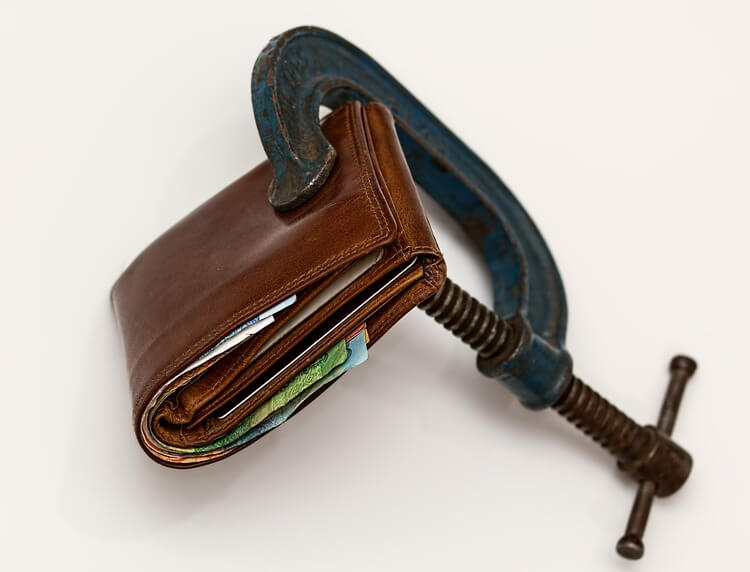How Debt Impacts Financial Well-being and Life Satisfaction
Dec 14, 2021
Debt isn't isolated to only certain people. It's something that plagues people from all social and cultural backgrounds. It's something that almost everyone in our society has struggled with at some point. And it's something that strongly impacts your financial well-being. ⠀
When you have a high degree of debt you'll often lack a feeling of financial independence. You'll feel stuck and spin your wheels. ⠀
The worst part? Even when there's a way out of debt, often the old beliefs, traumas, and ways of thinking will keep a person at the same debt level, no matter what their income level is. ⠀
This is why it's so important to understand what's going on inside of you. When you do you become free to achieve the financial independence and well-being you want. ⠀
Research on Indebtedness and Well-Being
In a recent study, the accumulation of a lot of debt was associated with lower emotional well-being and lower life satisfaction.
In this blog, I want to help you understand the components of financial well-being, how debt can impact these components, and what to do about it.

Debt is Common
Debt is very common amongst most people in our society, especially at certain stages of life.
Examples might include when you're buying your first home, investing in your education, starting a new business, or paying for your children's schooling.
In fact, about 77% of households hold debt in the US. With personal debt at an all-time high of $58,604 per adult.
However, there is a difference between being in debt and over-indebtedness.
Over-indebtedness is when household debt exceeds the resources of the household to meet payments and comfortably cover living expenses over the long term.
Although definitions vary, the general consensus is that over-indebtedness includes:
- High repayments relative to income (more than 30% of gross monthly income)
- High number of credit card commitments (4 or more)
- Being behind in payments
- Perceiving debt as a burden
However, some researchers suggest simply defining over-indebtedness as whether households self-report that they're having difficulty with debt repayment helps us understanding over-indebtedness.
Do you identify with this definition? Do you feel that it’s difficult to stay in front of your debt payments?
Debt and Subjective Well-Being
In the study, subjective Well-Being (SWB) was broken up into two facets: life satisfaction and emotional well-being.
Life satisfaction includes financial well-being, which we discuss frequently here at Healthy Love and Money.
Emotional well-being includes things like how often you feel emotion you’d label as negative.
The study also looked at self-reported health and sleep quality to determine how over-indebtedness was impacting people.
Over-indebtedness and Lower Life Satisfaction
In the study, over-indebtedness was associated with lower life satisfaction. It was also related to lower levels of emotional well-being.
Generally, those in the study who were over-indebted had been so over the long-term and suffered financial hardship. This suggests that there is a lasting impact of over-indebtedness that doesn't fade through time and may be related to other factors such as chronic pain or unemployment which may also lead to lower levels of life-satisfaction.
Over-indebtedness also impacts health. The study showed that those who were over-indebted reported poor overall health, more sleep-related disturbances, and worse sleep overall.
Perceived Control and Life Satisfaction
What's interesting is that the relationship between life satisfaction and over-indebtedness was partially explained by the perception of having some control and of overall financial well-being. In other words, those people who were over-indebted but who perceived themselves as still having some control over their financial reality and who had a greater sense of financial well-being experienced less of an impact from the over-indebtedness on their overall life satisfaction.
Furthermore, the perception of being in control of your life completely explained the relationship between over-indebtedness and emotional well-being. In other words, those who felt that they had control over their lives did not experience a negative emotional impact from over-indebtedness.
However, those who did not perceive themselves as having much control felt a more profound emotional impact from indebtedness.
A key point of interest here is that the study actually suggests that financial well-being matters in terms of life satisfaction, but not in terms of emotional well-being if people feel as though they have some control.
The study measured perceived control by asking "How often have you been feeling you do not have control over the important things in your life?" and "How often have you been feeling you are not able to deal with everything you have to do?". This suggests that those who lack financial resources may feel their self-control and autonomy are no longer in their own hands, both of which are essential for well-being.
Across all variables in the study, perceived control consistently influenced how people felt about themselves and their life.
When you don't feel like you have control over your life all aspects of life suffer. This includes sleep quality, perception of health, life satisfaction, emotional well-being, and financial well-being.

Why Perceived Control Could Help You Overcome
Perceived control impacts behavior, emotions, thinking, and decision-making.
When you feel that you have some control over your life you make new decisions and come to different conclusions than those who do not feel the same level of control.
Think about it, when you feel that you have no control you stop trying to change things. You give up and feel hopeless and helpless. You then have feelings and beliefs which reinforce your helplessness and hopelessness which stop you from trying to change your situation.
When you are in a difficult situation yet feel as though you have some control over your life you are much more likely to make decisions that will change your circumstances in the future. You may show persistence, resilience, and determination beyond what would be expected given the current set of circumstances.
In essence, feeling as though you have control over your life gives you hope and gives you grit. It helps you keep going when others would quit.
Other Impacts of Over-Indebtedness
I've seen the impact of debt on couples, and it can be very challenging.
Couples who are over-indebted will often have difficulty communicating, have challenges seeing eye to eye, use defense mechanisms that blame the other partner or external circumstances for what's going on financially instead of taking responsibility, and feel overwhelmed emotionally.
Increasing Perceived Control To Overcome Indebtedness
It's important for couples to receive support to overcome the feeling that they are powerless in order to overcome indebtedness.
One way that this study suggests to help overcome indebtedness is to increase a sense of perceived control.
This might include things like setting and striving for common goals or making sense of current circumstances by looking at everything involved including financial beliefs, family history, financial housekeeping, and spending.
Working through all the layers that keep you stuck in the cycle of debt is exactly what you can do in The Couples Guide to Financial Intimacy.
Would you like more 1 on 1 support? Then perhaps Therapy Informed Financial Planning is for the two of you. I invite you to schedule your free 30-minute discovery call today.
Wishing You Healthy Love and Money,
Ed Coambs
MBA, MA, MS, CFP®, CFT-I™, LMFT
Curious About Your Attachment Style?
Take the Attachment Style Quiz now and learn how it impacts your relationships, finances, and life!



